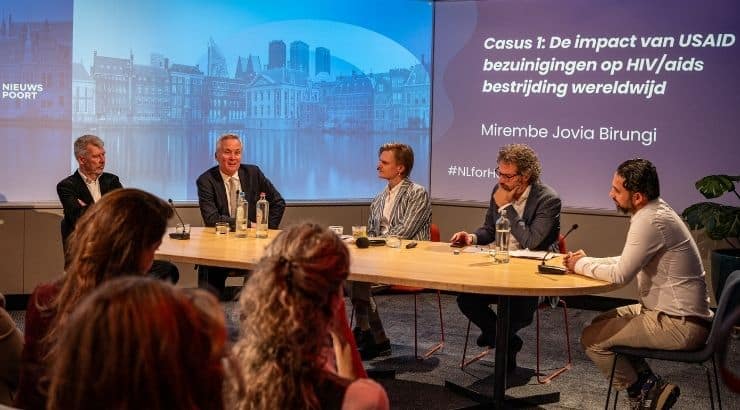The Global Financing Facility (GFF) – a global health initiative aiming to end preventable deaths and improve the life of women, children, and adolescents in low- and middle-income countries – is evolving. Continuous lobby and advocacy by civil society has influenced its direction, making it more inclusive. In this blog, we will elaborate on how Wemos influenced the new strategy of this major global health initiative in collaboration with our partners and networks.
Lack of civil society engagement, inclusivity, and transparency
Wemos has been critically following developments of the GFF since 2018. We were particularly concerned about transparency and inclusivity in the set-up of the GFF. Those who follow our work may have seen the joint letter we sent to the GFF before its replenishment in November 2018, stressing our concerns. Since then, we have had a follow-up discussion with the GFF during the World Bank/IMF Spring Meetings in April 2019. In these meetings we raised the insufficient civil society engagement with the GFF at all levels and the lack of inclusivity and transparency of the highest decision-making body of the GFF, the Trust Fund Committee. Even though they acknowledged and understood our concerns and arguments, we did not see any changes being made.
A great advocacy opportunity: GFF Strategy Refresh
This year, in 2020, the GFF celebrated its 5th birthday and went through a ‘strategy refresh’, to develop its strategy for the next five years (2021-2025). This exercise, commissioned by the Trust Fund Committee, started at the end of 2019. We saw the development of a new, ‘refreshed’ strategy for the GFF as a unique advocacy opportunity. Like we stated in our peer-reviewed article at the SRHM journal, this was “the moment for the GFF and its partners to take stock and adapt, to ensure the ambitions set five years ago can be realised as soon as possible, in order not to fail those women, children and adolescents who are in dire need of better access to care.”
In civil society discussions, the issue of governance started coming up more and more. We set-out to assess possible set-ups of the GFF and the implications for civil society. To do so, we brought together various CSOs in a webinar to discuss different set-ups. We also developed a factsheet compiling the findings of our research on the topic and shared it within our networks. Last October, we were back at the World Bank/IMF Annual Meetings with a session at the Civil Society Policy Forum titled “5 Years with the GFF: Challenges and Lessons Learned”. We used our new insights to share experiences from GFF countries, and discuss lessons learnt in the first 5 years of the GFF and the upcoming Strategy Refresh.
The final push
A few days later, the GFF would present its new strategy for endorsement by the Trust Fund Committee. After having analysed and commented the consecutive drafts of the new strategy, we prepared for the final push: together with several members of the Dutch GFF Community of Practice, we developed recommendations which we shared with the GFF Secretariat, the Dutch Ministry of Foreign Affairs’ representatives to the GFF, our contacts from other GFF donors (GiZ-Germany, European Commission, Norad-Norway) and our civil society networks and country partners. We used this statement for our inputs to the GFF’s online public consultation on the Strategy Refresh and called on other CSOs to do the same.
Our goal was clear: a more inclusive, transparent, gender-transformative GFF, with enough space and support for civil society engagement and an equitable approach to health financing.
The first successes
On October 9th, 2020, the Dutch representatives to the GFF sent us the final version of the GFF Strategy Refresh. When comparing the final version with the previous draft, we were very happy to see that the GFF had incorporated several key elements from our input:
- The health workforce was mentioned for the first time in a GFF strategy document, while it had been missing in previous drafts.
- Civil society engagement was more prominently addressed.
- The role of gender inequality and unequal power dynamics during data collection, analysis and in designing technical assistance was highlighted, as well as the issue of intersecting identities that lead to marginalisation.
- There was a promise to ensure private sector involvement in health care produces equitable and inclusive health outcomes.
- Domestic resource mobilisation efforts will continue.
The Investors Group and the Trust Fund Committee endorsed the new strategy at their meetings on 20-22 October, including these key elements. Moreover, we were thrilled to know that the Trust Fund Committee finally agreed to start publishing its minutes and meeting documents.* Up until now, the only publicly available documents were the minutes of the Investors Group meetings. We consider this to be an important success. It is the result of collective advocacy by civil society, in which Wemos has played a key role.
Of course, there is still room for improvement. For example, civil society and GFF recipient countries are still not represented in the Trust Fund Committee. However, knowing the details of the Trust Fund Committee’s deliberations gives us more insight and evidence to continue our advocacy.
Next steps; monitoring the implementation of the new strategy
We continue our work on the GFF at all levels, in close collaboration with country CSOs, the Dutch Community of Practice on the GFF and the global GFF Civil Society Coordination Group. In 2021, we will focus on the implementation of the new strategy, however, not in a silo. Let’s not forget that the GFF has signed the Global Action Plan for Healthy Lives and Well-Being for All, committing to better coordination with other global health initiatives. Therefore, we will focus on the coordination of the GFF with Gavi and the Global Fund, particularly on their approaches to health financing. Stay tuned!
* Update February 2021: it came to our understanding that not the full documentation, but a summary of decisions was to be publicly shared. To date, however, this has not been done. Therefore, we will continue our advocacy on this issue.
About the GFF
The Global Financing Facility is an innovative funding mechanism, supported by the World Bank, launched in July 2015 with the objective to end preventable deaths of women, children, and adolescents in low- and middle-income countries, and to improve their quality of life. The GFF aims to contribute to closing the significant annual funding gap in the health of women, children, and adolescents and envisions to support national governments in transforming and increasing their health budget.
Our work on the GFF
- Interactive document: Connecting voices: creating space for civil society engagement in the GFF
- Our joint open letter to the GFF
- Blog: ‘After the GFF replenishment: how is GFF addressing civil society’s concerns?
Photo: Pixabay




